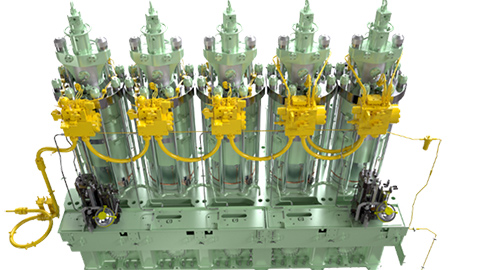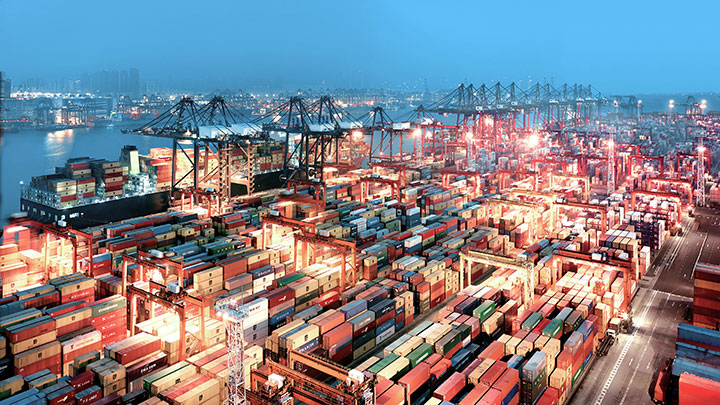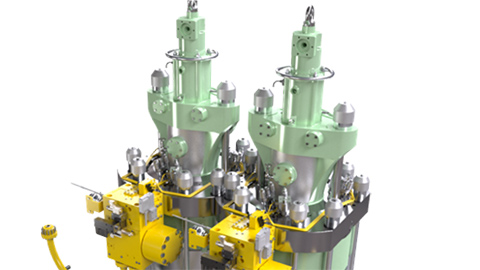MAN B&W ME-GI prepares your fleet for future regulations
The MAN B&W ME-GI two-stroke dual-fuel engine provides a future-proof solution for LNG/methane-powered vessels thanks to its negligible methane slip and high fuel efficiency.
Based on one of the industry’s most trusted platforms, the MAN B&W ME-GI uses a high-pressure fuel supply system and is suitable for many types of vessels. The engine achieves exceptionally low methane slip emissions and provides a large degree of flexibility for meeting emissions regulations, now and in the future. We have also refined and simplified the design, upgrading key components, and improving reliability.
The world’s most efficient engine for methane as a fuel
Perfect for new builds or retrofits, the MAN B&W ME-GI minimizes operating costs by delivering high industry-leading thermal efficiencies no matter which fuel is used. This is a huge advantage, especially for container vessels in a market with fluctuating fuel prices. The ME-GI can also be fueled with bio-methane as well as synthetic natural gas, providing a clear route towards greenhouse gas reductions.
Next-generation performance and efficiency
Key benefits

- Proven two-stroke MAN B&W engine technology
- Minimal environmental impact (low emissions thanks to negligible methane slip and reduced CO2 emissions)
- No need to compensate with liquid oil fuels to accommodate low methane numbers or high ambient temperatures
- Flexible operation using fuel oil or LNG
- Knocking is not an issue
- Supports waste heat recovery (WHR)
- Easy retrofit compared to Otto cycle engines
Low OPEX

The ME-GI is built for low OPEX, delivering the same industry-leading thermal efficiency no matter which fuel is used. This is a huge advantage in a fluctuating fuel market where LNG bunkering will become the norm. The auxiliary equipment costs have been reduced and the engine’s installation is simplified. Furthermore, key components have been updated to improve performance and deliver a more environmentally friendly solution.
Component upgrades

The new MAN B&W ME-GI incorporates a range of key component upgrades that improve reliability, maximize efficiency and lower OPEX, helping you to stay competitive in a challenging market.
- Lowest gas consumption of any marine two-stroke engine
- Simplified piping system provides a more compact solution with fewer components, and therefore lower maintenance costs
- New gas block with an improved window valve enables cut-out of an individual cylinder operating on gas, while allowing continued operation on fuel oil
- Updated pilot oil injection system enables the pilot oil energy fraction be lowered to just 1.5% for certain bore sizes
- Optional compact pump vaporizer unit features embedded redundancy (3 x 50%) and integration with the ME-GI engine control system
Service solutions for optimum cost efficiency of your MAN B&W ME-GI engine
Explore your options for the MAN B&W ME-GI
The new MAN B&W ME-GI two-stroke dual-fuel engine is built to support your power needs today and for the future.
Continue reading
-
ME-GI/GIE pump vaporiser unit for LNG and ethanepdf, 3716 KB
Related products
Related news
EGR Offered for Dual-Fuel ME-GA Engine
MAN Energy Solutions has announced that it is to offer its proprietary EGR (Exhaust Gas Recirculation) system as an emissions solution for its new, low-speed ME-GA engine, the Otto-cycle variant of its established ME-GI dual-fuel engine. EGR is a NOx-emissions-reduction technique that ensures IMO Tier III-compliance in both diesel and gas mode.
The company has long experience with the emission-reduction technology and reported the first order for an EGR system in 2011 when it was fully integrated within the MAN B&W 6S80ME-C9 main engine of a 4,500 teu containership newbuilding.
Thomas S. Hansen, Head of Promotion and Customer Support, MAN Energy Solutions, said: “Nine years have passed since our very first EGR system passed its Factory Acceptance Test, and the knowledge we have subsequently gained in the field has led to today’s fully-mature solution. Our EGR system not only achieves NOx-compliance, but also delivers a performance upgrade for both conventional and now ME-GA engines.”
MAN Energy Solutions reports that EGR will enable the ME-GA to reduce specific gas consumption by ~3%, and specific fuel-oil consumption by 5%. It will also significantly reduce methane slip by 30 to 50% and solve the issue related to pre-ignition on Otto-cycle engines.
Hansen continued: “With our hard-earned experience – added to the rigourous testing that all our EGR systems undergo – we are the de-facto market leader and play a vital role in decarbonising the maritime industry. Our robust EGR solutions fully integrate with other ship systems and are easily integrated with the ME-GA engine.”
MAN Energy Solutions states that it has received orders for over 241 engines with EGR, with more than 33 units already in service. The company expects to deliver the first, commercial ME-GA low-pressure dual-fuel engine by end-2021.
EGR solution
As previously stated, EGR will help reduce the ME-GA’s methane slip by 30 to 50%, while lowering specific gas consumption by around 3% and specific fuel-oil consumption in diesel mode by 5%. EGR will enable the ME-GA to meet Tier III requirements in both fuel oil and gas modes without additional aftertreatment.
MAN Energy Solutions plans to make the EGR option available from late 2021, concurrent with the introduction of the ME-GA. The company’s experience with designing and delivering low-pressure and high-pressure EGR versions has enabled it to bring the new solution to market in a relatively short time.
The ME-GA EGR solution is a high-pressure system, which can be integrated into existing engine-room designs, and the EGR unit itself does not change the engine footprint. Its design-similarity to that of ME-C engines’ EGR systems will lower its price point, since the supply chain and components are already matured.
The EGR system works through drawing around 30 to 50% of the engine’s exhaust gas into the EGR receiver, where it passes through a pre spray to lower its temperature, before passing through a cooler spray. After passing through a water-mist catcher, the gas then goes through a blower to increase pressure back up to scavenging air pressure, before being fed back into the compressor and the engine.
The volume requirements of the ME-GA EGR system are significantly lower with, for example, less pipework required than for low-pressure EGR solutions.
Introducing an EGR solution also improves the stability of the combustion process. MAN Energy Solutions is currently researching how far it can lower methane slip while maintaining a good equilibrium with recirculation.
About ME-GA
MAN Energy Solutions is developing the high efficiency, low-pressure, two-stroke, dual-fuel MAN B&W ME-GA engine at its Research Centre Copenhagen. The engine delivers a low CAPEX solution aimed at certain vessel types and applications – such as LNG carriers – that are able to use ‘boil-off’ gas as a source of fuel, or smaller ships where low capital outlay is a priority.
Based on the well-proven MAN B&W dual-fuel design with minimal installation requirements, the MAN B&W ME-GA uses an efficient ignition concept and unique gas-admission system that delivers safe and reliable operation.
The ME-GA furthermore features minimal operational costs, simple supply and purging concepts, and low maintenance costs for its fuel-gas supply system.Documents
-
20201124_MAN_ES_PR EGR ME-GA_EN
-
20201124_MAN_ES_PR EGR ME-GA_DE
Contact
Nils Søholt
Trade Press Marine
Group Communications & MarktingMAN Energy SolutionsTeglholmsgade 412450 Copenhagen SVDenmark
nils.soeholt@man-es.com t +45 33 85 26 69Available languages
- DE ·
- EN
Get notified about press releases
Alternative fuels for your two-stroke powered vessel: Ammonia, methanol and methane in focus
Register for our next MAN ExpertTalk on alternative fuels for large merchant marine vessels. We will provide insights into the most promising marine fuels of the expected future fuel mix for two-stroke vessels, namely ammonia, methanol and methane.
Further, we will inform about the latest product developments and applications as well as reasons why these fuels have the potential to offer a straightforward path for the future maritime energy transition.
- Wednesday, April 24, 15:00 – 15:45 (W. Europe Standard Time)
- Thursday, April 25, 10:00 – 10:45 (W. Europe Standard Time)
